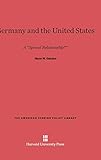Germany and the United States : A "Special Relationship" / Hans W. Gatzke.
Material type: TextSeries: The American Foreign Policy Library ; 24Publisher: Cambridge, MA : Harvard University Press, [2013]Copyright date: ©1980Edition: Reprint 2014Description: 1 online resource (314 p.) : illustratedContent type:
TextSeries: The American Foreign Policy Library ; 24Publisher: Cambridge, MA : Harvard University Press, [2013]Copyright date: ©1980Edition: Reprint 2014Description: 1 online resource (314 p.) : illustratedContent type: - 9780674418240
- 9780674418257
- 327.43
- E183.8.G3
- online - DeGruyter
| Item type | Current library | Call number | URL | Status | Notes | Barcode | |
|---|---|---|---|---|---|---|---|
 eBook
eBook
|
Biblioteca "Angelicum" Pont. Univ. S.Tommaso d'Aquino Nuvola online | online - DeGruyter (Browse shelf(Opens below)) | Online access | Not for loan (Accesso limitato) | Accesso per gli utenti autorizzati / Access for authorized users | (dgr)9780674418257 |
Browsing Biblioteca "Angelicum" Pont. Univ. S.Tommaso d'Aquino shelves, Shelving location: Nuvola online Close shelf browser (Hides shelf browser)

|

|

|

|

|

|

|
||
| online - DeGruyter Making Manhood : Growing Up Male in Colonial New England / | online - DeGruyter Signs of Sense : Reading Wittgenstein’s ‹i›Tractatus‹/i› / | online - DeGruyter Communities of Honor and Love in Henry James / | online - DeGruyter Germany and the United States : A "Special Relationship" / | online - DeGruyter The Taming of Romanticism : European Literature and the Age of Biedermeier / | online - DeGruyter Natives and Newcomers : The Ordering of Opportunity in Mid-Nineteenth-Century Poughkeepsie / | online - DeGruyter The Depletion Myth : A History of Railroad Use of Timber / |
Frontmatter -- Foreword -- Preface -- Contents -- Maps -- Abbreviations -- Introduction -- 1. Germany The Land and the People -- 2. Germany and the United States 1776–1914 -- 3. World War I A Turning Point, 1914–1918 -- 4. The Weimar Republic A Democratic Interlude, 1918–1933 -- 5. Hitler and the “Third Reich” 1933–1939 -- 6. World War II The End of the German Reich, 1939–1945 -- 7. One Germany or Two? Occupation, 1945–1949 -- 8. The Germany of Konrad Adenauer 1949–1963 -- 9. From Adenauer to Brandt 1963–1974 -- 10. The German Federal Republic since 1974 -- 11. The German Democratic Republic since 1961 -- 12. Conclusion A “Special Relationship”? -- Suggested Reading, Index -- Suggested Reading -- Index -- Backmatter
restricted access online access with authorization star
http://purl.org/coar/access_right/c_16ec
Beginning with Bismarck's forging of a nation with "iron and blood," Gatzke tells of Germany's relentless struggle for domination in Europe and in the West, its defeat in two world wars, its division, East Germany's travail, and West Germany's search for identity as a modern democratic state. A discerning statement about Germany and other nations, this book reevaluates for the general reader and the historian the impact of rapid industrialization, the origins of the world wars, the question of war guilt, the decade of Weimar democracy, and the rise and fall of Hitler. Gatzke looks anew at the economic miracle in West Germany and the consequences of making prosperity the cornerstone of a new republic. It is to the realities of these German characteristics as an evolving nation-state that Gatzke relates American foreign policy and perceptions. He recounts the American fluctuations, from favorable to hostile to friendly, as Germany's policies and fortunes changed, and he places the division of Germany in historical perspective.
Mode of access: Internet via World Wide Web.
In English.
Description based on online resource; title from PDF title page (publisher's Web site, viewed 29. Nov 2021)


